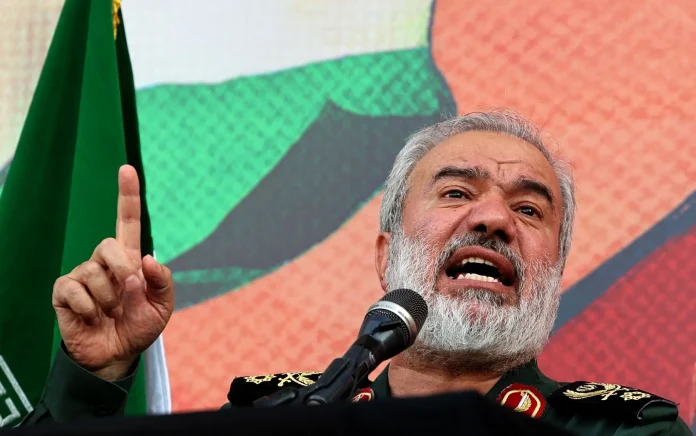The death toll from Israeli airstrikes on the eastern Lebanese city of Baalbek and nearby villages rose to 11 people on Thursday, with 14 others injured, as Iran’s Supreme Leader Ayatollah Ali Khamenei has given the order to prepare for a strike on Israel.
Death toll from Israeli airstrikes on eastern Lebanon rises to 11
The strikes began with an attack on a house in the village of Buday, killing a man, his wife and their two children, the Lebanese agency said on Friday.
Israeli forces carried out further airstrikes on residential areas, particularly the town of Makneh, where six members of one family were killed and six others were wounded. The agency reported that additional airstrikes hit the southern entrance to Baalbek, destroying a house, killing a woman and injuring five others.
A strike on the nearby village of Douris severely damaged homes, businesses and public infrastructure, and left three people with minor injuries.
The news agency highlighted the wider impact of Israeli airstrikes on Baalbek-Hermel and Central Bekaa, which have so far reached 1,035 separate strikes, resulting in 528 deaths and 1,069 injuries across the region.
Last month, Israel launched a large-scale air campaign in Lebanon against what it claims are Hezbollah targets, escalating a year of cross-border hostilities between Israel and the group after Israel launched a brutal offensive on Gaza.
Israeli attacks have killed nearly 2,900 people and injured more than 13,000 since last October, according to Lebanese health authorities. Israel expanded the conflict by launching an invasion of southern Lebanon on October 1.
Lebanon, Gaza ceasefire hopes dim as Israeli PM puts more conditions
Israeli Prime Minister Benjamin Netanyahu told visiting US envoy Amos Hochstein and Middle East adviser Brett McGurk on Thursday that any ceasefire agreement with Hezbollah must guarantee Israel’s security. Netanyahu’s office said after the meeting in Jerusalem:
The Prime Minister specified that the main issue is not paperwork for this or that deal, but Israel’s determination and capacity to ensure the deal’s application and to prevent any threat to its security from Lebanon.
Speaking at a military academy in Israel’s Negev desert on Thursday, Netanyahu told reservists that he appreciated American support in the ongoing wars against Hamas in Gaza and Hezbollah in Lebanon, but would not bow to all US demands. He said:
My policy is simple. I say yes when it’s possible, but I say no when it’s needed,” he told trainee officers. Hamas will no longer control Gaza and Hezbollah will not settle on our northern border. We are also blocking weapons supply chains from Iran to Hezbollah via Syria and from there to Lebanon.
Khamenei gives the order to prepare for an attack on Israel
Iran’s Supreme Leader Ayatollah Ali Khamenei has given the order to prepare for a strike on Israel, the New York Times reported on Thursday, citing three Iranian officials. According to the newspaper, the decision was made after the leader was briefed on the extent of the damage caused by the Israeli strike on Iran last Saturday. According to them, Khamenei was impressed by the amount of casualties and destruction and said that ignoring the results of the Israeli strike would mean “admitting defeat.”
The officials said the strike would be carried out after the US presidential election on November 5 so as not to worsen the chances of Republican candidate Donald Trump.
Earlier, Kamenei’s senior aide Mohammad Mohammadi Golpayegani warned of a “harsh and regrettable” response to the Israeli strike. The influential cleric told Tasnim news agency:
The recent action of the Zionist regime in attacking parts of our country was a desperate move and the Islamic Republic of Iran will give it a harsh and regretful response.
He praised the work of Iran’s air defence that “prevented the Zionist regime’s militants from infiltrating the country” and said the damage from the strikes was “minimal.”
Commander of Iran’s Revolutionary Guards Corps Hossein Salami said Israel had made a mistake and would see an Iranian response that would “surpass imagination.” He said Israel was wrong to think it could change the balance of power in the region by launching a few missiles, but it saw its air defences fail during Iran’s October 1 strike. Iran fired about 200 ballistic missiles at Israel during that attack.
Prime Minister Benjamin Netanyahu sent a clear message to Iran in his speech at the IDF cadet graduation ceremony, saying that Israel’s primary goal of preventing Iran from obtaining a nuclear capability remains unchanged. He said:
The bravado of the Iranian regime cannot mask the simple fact that Israel today has a greater freedom to operate in Iran than ever before.
